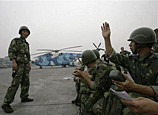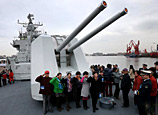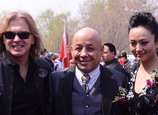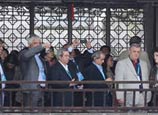
CAIRO, April 25 (Xinhua) -- Egypt is seeking to reach a balance in its ties with Russia and the United States to avoid depending solely on one powerful ally which could in the end harm its own interests, analysts said.
After discussing military cooperation with his Russian counterpart Vladimir Putin last week in Moscow, Egypt's President Mohamed Morsi also held talks with visiting U.S. Secretary of Defense Chuck Hagel Wednesday in Cairo on military ties.
"Morsi's visit to Russia does not seek to replace alliance with the United States, nor does it underestimate relations with Washington. It just seeks to create balance in Egypt's foreign relations with 'armament organizations,'" Nabil Fouad, strategic sciences professor at the Cairo-based Military Academy, told Xinhua.
DIFFERENT APPROACH
Fouad noted that after the 2011 upheaval which toppled Hosni Mubarak, a strong ally of the United States, Egypt's new leadership seeks to start a different approach in its foreign ties.
Although the United States has the upper hand in arming the Egyptian army through an annual aid of about 1.3 billion U.S. dollars, the Russian arming systems are still operating in the Egyptian army, Fouad said.
On Morsi's talks with Putin, presidential spokesman Ehab Fahmi said the two leaders agreed that Russia will help Egypt conduct studies at a suspended nuclear station and develop an Egyptian experimental reactor.
"There will be a Russian delegation to lay out the details of these issues as soon as possible," Fahmi said.
The talks about reviving the nuclear projects in Egypt have raised the concerns of Washington, which said it would seek a clarification from the Egyptian side.
Fouad reiterated that "Washington will cripple the Russian- Egyptian relations as it wants to keep dominance of the Middle East region to ensure the security and superiority of U.S. strongest ally Israel."
Egypt's nuclear development is rejected by both the United States and Israel, as it will not serve their best interests, he said.
SEEKING BALANCE
Morsi's talks with Putin represents an opportunity for Russia to regain a foothold in the region, said Samir Ghattas, head of Maqdis Center for Strategic Studies.
"Egypt is a major regional power and a historical ally of Russia during the time of late Egyptian President Gamal Abdel- Nasser," Ghattas said.
He noted that Morsi wants to prove to the world that he is not a prisoner of U.S. policies, and that "there is a balance in Egypt 's foreign relations based on mutual interests."
However, Ghattas stressed that an Egyptian administration of Islamic background could not build strong ties with Russia, especially taking into consideration their different opinions about the Syrian conflict.
He described the future Russian-Egyptian ties as "very limited" compared to Egypt's relations with the United States, which is still backing Morsi's Islamist rule.
For his part, Nabil Zaki, political expert and official spokesman of Tagammu Party, said Morsi is resorting to Russia after Washington's regular criticism of Egypt's recurrent turmoil and unstable domestic situation.
Egypt attempts to restore strong relations with Russia to create a balance in its ties with big powers, but not at the expense of its relations with Washington, said Zaki.
( Mahmoud Fouly contributes to this story)
















 Giant pandas safe in quake-hit zone
Giant pandas safe in quake-hit zone


![]()
